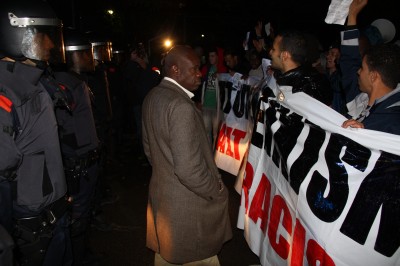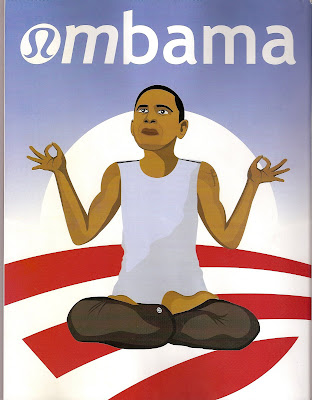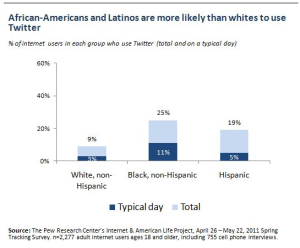The following is a guest post by Catalan journalist Lluís de Nadal Alsina. He’s worked for four years at Public Catalan Television, and now serves as a reporter at the private TV station, 8TV.

Ruben and Mai, a couple of 20-somethings, wander with their three American Pitbulls around the cold and dark streets of Salt, a small town near Barcelona with a 50% immigrant population. “I never go out without my dogs”, she says, “many North Africans have threatened to rape me”. He defines himself as “racist” and complains that most immigrants are either thieves or drug dealers. “I’m fed up with seeing them drive expensive Audis while I can’t even afford a motorcycle”, he grumbles. They are both unemployed and have a kid on the way. “I wish we could raise the baby somewhere else”, she laments.
Only a few minutes later, in the same area, we start hearing cries of “Racists, out of Salt!” A demonstration of immigrants is making it’s way towards the sports center where Josep Anglada, the most significant xenophobic leader in Spain, is about to give the opening speech of his campaign for the November 20th Spanish general election. A police cordon blocks off access to the venue to avert any clashes. “Salt is a pressure cooker”, a police officer tells me, “and any spark can blow it up. There’s no coexistence here. People just put up with each other”.
In the current economic crisis, powder kegs such as Salt are a breeding ground for the wave of xenophobia sweeping across Europe. Fear of Islam has become the main strategy of neo-populist parties to carve out a place in the parliaments of a dozen European countries. Meanwhile, traditional parties flirt with racism to maintain their voters’ support. Old Europe, bastion of democracy and freedom, is giving in to populism and xenophobia.
Denmark, for example, beefed up border controls to curb illegal immigration in a move that caused concern among EU neighbors, since the 1995 Shengen Agreement abolished internal borders; France deported almost 10,000 Romanian Gypsies last year; and Switzerland imposed a national ban on the construction of minarets, the prayer towers of mosques. The recent massacre in Oslo, perpetrated by anti-muslim Anders Behring Breivik, showed that latent hatred and bigotry can unleash occasional episodes of extreme brutality.
In Spain, engrossed in the general election campaign, the anti-muslim discourse surfaces again and again. Right-leaning nationalist parliamentary leader Josep Antoni Duran i Lleida just expressed his concern for “the loss of our national identity to the birth of more Mohammeds than Josés”, while Alicia Sánchez Camacho, leader of the conservative People’s Party, proclaimed that “burkas should be banned across the country”. For the first time in Spain’s democracy, a xenophobic leader, Josep Anglada, could enter Parliament.
“Go get ‘em!”, Anglada cries. It is the grand finale to his Salt speech before a hundred fanatics who break out into cheers each time he drops a racist comment, such as “soon we won’t know if we live in Spain or in Afghanistan.”
Just a few hours before, in his hometown of Vic, another small city on the outskirts of Barcelona with an almost 30% immigrant population, he shows his other face. In the main plaza, he gives out pamphlets himself, greeting almost everyone by name. He works for every vote with a smile.
With the cleverness of someone who has always moved on the edge of democracy -he is a long-standing fascist and follower of Franco, the former Spanish dictator- he dodges my questions. “I’m not a radical”, he interrupts me, “but just the people’s megaphone. The country is tired of political correctness”.
Chatting with citizens of Vic, one perceives that his discourse has made a deep impression on them. “Things have to be called by their names”, a local man tells me, “it is not acceptable that people born and bred in Vic be forced out of their homes because their neighborhood has gotten filled with immigrants. Nobody wants them nearby. If a Moroccan moves into your block, the value of your apartment plummets instantly.” “People keep it quiet”, he adds, “but everybody votes Anglada”.
Rafael Jorba, journalist and author of “La mirada del otro. Manifiesto por la alteridad” (In the Other’s Gaze. An Otherness Manifesto), explains to me that “it is not a matter of discourses, but a matter of resources”. “As immigration increases, those who arrived in Spain 30 years ago have to share public subsidies with newcomers. The struggle is between the poor and the poorer.”
“In times of crises”, he continues, “the only governments that survive are the ones that best manage fear. But the future is not built out of fear, but out of hope. Even though today’s Europe resembles a sepia tone picture, a still image of the past, a new generation capable of managing hope is to come. Sooner or later, protesters from the so-called Spanish Revolution and the Occupy Wall Street movement will take over. They have grown up in this crisis, but they have been able to travel around the world thanks to exchange programs or low cost flights”.
This future, though, still seems to be very far away from cities like Vic or Salt. “I don’t understand why we have to be the bad guys of the movie”, a Moroccan woman complains. Her greatest wish is for her three year old girl to have a promising future, but she is concerned because in her daughter’s public day care center 100% of the kids are immigrants. As I interview her in the Vic market, we are insulted twice because the baby carriage seems to be blocking the access.
In Catalan:
Xenofòbia en una Catalunya dividida
El Rubén i la Mai passegen amb els seus tres American Pit Bulls pels carrers foscos i freds de Salt un vespre plujós de novembre. “Jo sense els meus gossos no surto”, diu ella, “molts moros m’han amenaçat que em violarien”. Ell, que s’autodefineix com a “racista”, es queixa que la majoria de magrebins a Salt viuen de robar o vendre droga i que està fart de veure com van “amb Audis A6” quan ell no pot pagar-se “ni un ciclomotor”. Tots dos estan a l’atur i esperen un fill, que no volen que creixi aquí.
Només uns minuts després, des de la mateixa zona, comencen a sentir-se crits de “Racistes, fora de Salt!”. Una manifestació d’immigrants subsaharians i magrebins es dirigeix cap al poliesportiu on la Plataforma per Catalunya de Josep Anglada està a punt de començar el primer acte de la campanya de les eleccions del 20N. Un cordó policial els barra el pas per evitar els enfrontaments d’altres ocasions. “Salt és una olla a pressió”, em diu un Mosso d’Esquadra, “qualsevol espurna ho fa saltar tot. Aquí no hi ha convivència, la gent se suporta”.
En el context actual de crisi, polvorins com el de Salt, amb un 50% d’immigració, són el caldo de cultiu de l’onada de xenofòbia que escombra Europa. Amb la por a l’Islam com a únic argument electoral, partits neo populistes ja s’han fet un lloc als parlaments d’una dotzena de països de la Unió Europea. Mentrestant, els partits tradicionals coquetegen amb el racisme per mantenir el suport del seu electorat. La vella Europa, bastió de la democràcia i la llibertat, cedeix davant del populisme i la xenofòbia.
Dinamarca, per exemple, va reinstaurar els controls fronterers per frenar la immigració il·legal, en un moviment que va provocar consternació entre els seus veïns europeus, ja que el Tractat de Shengen va abolir l’any 1995 les fronteres internes; França va deportar l’any passat gairebé 10.000 gitanos rumanesos; i Suïssa va prohibir la construcció de minerets a les mesquites. La massacre d’Oslo, perpetrada per l’ultra dretà Anders Behring Breivik, ha demostrat que l’odi i el fanatisme latents poden defermar episodis puntuals d’extrema barbàrie.
A Espanya, en plena campanya electoral, el candidat de CiU Josep Antoni Duran i Lleida es mostrava “preocupat perquè neixin més Mohammed que José” o perquè “els catalans perdem la nostra identitat”. La líder del PP català Alícia Sánchez Camacho proclamava que “el burka s’havia de prohibir a tot el país”. Per primera vegada a la història de la democràcia espanyola, un líder xenòfob, Josep Anglada, podria arribar al Congrés.
“A por ellos”, crida Anglada. És la traca final del míting a Salt davant d’un centenar de fanàtics que aplaudeixen enfervorits cada vegada que deixa anar un comentari racista, com que “d’aquí poc no sabrem si vivim a Catalunya o l’Afganistan”.
Hores abans, a Vic, la seva ciutat natal i feu electoral, Anglada mostra una cara ben diferent. A la plaça Major, reparteix ell mateix propaganda electoral durant tot el matí, saludant pel seu nom pràcticament tothom qui s’acosta a la paradeta de PxC. Es treballa cada vot amb un somriure.
Amb l’habilitat de qui s’ha mogut sempre al límit de la democràcia -va ser membre de l’organització d’ultradreta franquista Fuerza Nueva-, esquiva les meves preguntes. “Jo no sóc radical”, m’interromp, “només sóc l’altaveu de la gent, que ja s’ha cansat del políticament correcte”.
Parlant amb els ciutadans de Vic, un s’adona que el seu discurs ha calat fons. “S’han de dir les coses pel seu nom”, em diu un veí passejant per la plaça, “no pot ser que els d’aquí de tota la vida hagin hagut de marxar perquè se’ls ha omplert el barri d’immigrants. Ningú els vol al costat. Si un marroquí ve a viure al teu bloc, el teu pis perd valor automàticament.” “La gent calla”, afegeix, “però tothom vota Anglada”.
Rafael Jorba, periodista i autor del llibre “La mirada del otro. Manifiesto por la alteridad”, m’explica que “no estem davant d’un problema de discursos, sinó de recursos”. “Amb l’augment de la immigració, els que van arribar fa 30 anys i els que arriben ara s’han de repartir les beques menjador o la renda mínima d’inserció. La lluita és entre pobres i miserables.”
“En època de crisi”, continua Jorba, “els únics governs que resisteixen són els que millor administren les pors. Però el futur no es construeix a partir de les pors, sinó de les esperances. Tot i que l’Europa actual sigui una foto sèpia, una imatge fixe del passat, ha de venir una nova generació capaç d’administrar les esperances. Més tard o més d’hora, els indignats de la Spanish Revolution o del moviment Occupy Wall Street governaran. Ells han crescut en aquesta crisi, però han vist molt món gràcies a les beques Erasmus o als vols low cost”.
El futur, però, avui sembla encara molt lluny de Vic o de Salt. “No entenc per què nosaltres hem de ser els dolents de la pel·lícula”, es queixa una marroquina. El seu únic desig és poder-li donar un futur a la seva filla de tres anys, però està preocupada perquè a la guarderia pública on la porta el 100% dels alumnes són immigrants. Mentre xerrem al mercat de Vic, ens insulten dues vegades perquè sembla ser que el cotxet està bloquejant el pas.








